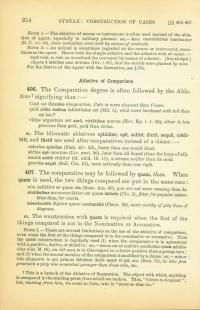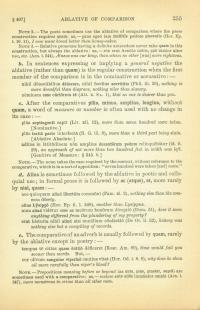406. The comparative degree is often followed by the ablative1 signifying than.
Catō est Cicerōne ēloquentior.
Cato is more eloquent than Cicero.
Quid nōbīs duōbus labōriōsius est? (Mil. 5)
What more burdened with toil than we two?
Vīlius argentum est aurō, virtūtibus aurum. (Hor. Ep. 1.1.52)
Silver is less precious than gold, gold than virtue.
a. The idiomatic ablatives opīniōne, spē, solitō, dictō, aequō, crēdibilī, and iūstō are used after comparatives instead of a clause.
celerius opīniōne (Fam. 14.23)
faster than one would think
sērius spē omnium (Liv. 26.26)
later than all hoped
(than the hope of all)
amnis solitō citātior (id. 23.19.11)
a stream swifter than its wont
gravius aequō (Sall. Cat. 51)
more seriously than was right
407. The comparative may be followed by quam (than). When quam is used, the two things compared are put in the same case.
Nōn callidior es quam hīc. (Rosc. Am. 49)
You are not more cunning than he.
cōntiōnibus accommodātior est quam iūdiciīs (Clu. 2)
fitter for popular assemblies than for courts
misericordiā dīgnior quam contumēliā (Pison. 32)
more worthy of pity than of disgrace
a. The construction with quam is required when the first of the things compared is not in the nominative or accusative.
Note 1— There are several limitations on the use of the Ablative of Comparison even when the first of the things compared is in the nominative or accusative. Thus the quam construction is regularly used (1) when the comparative is in agreement with a genitive, dative, or ablative.
Senex est eō meliōre condiciōne quam adulēscēns. (Cat. M. 68)
An old man is in this respect in a better position than a young man.
And (2) when the second member of the comparison is modified by a clause.
Minor fuit aliquantō is quī prīmus fābulam dedit quam eī quī, etc. (Brut. 73)
He who first presented a play was somewhat younger than those who, etc.
Note 2— The poets sometimes use the Ablative of Comparison where the prose construction requires quam.
Pāne egeō iam mellītīs potiōre placentīs (Hor. Ep. 1.10.11)
I now want bread better than honey-cakes.
Note 3— Relative pronouns having a definite antecedent never take quam in this construction, but always the ablative
Rēx erat Aenēās nōbīs, quō iūstior alter nec, etc. (Aen. 1.544)
Æneas was our king, than whom no other [was] more righteous, etc.
b. In sentences expressing or implying a general negative the ablative (rather than quam) is the regular construction when the first member of the comparison is in the nominative or accusative.
Nihil dētestābilius dēdecore, nihil foedius servitūte. (Phil. 3.36)
Nothing is more dreadful than disgrace, nothing viler than slavery.
nēminem esse cāriōrem tē (Att. 10. 8A. 1)
that no one is dearer than you
c. After the comparatives plūs, minus, amplius, longius, without quam, a word of measure or number is often used with no change in its case.
Plūs septingentī captī. (Liv. 41.12)
More than seven hundred were taken. [Nominative]
plūs tertiā parte interfectā (B. G. 3.6)
more than a third part being slain [Ablative Absolute]
Aditus in lātitūdinem nōn amplius ducentōrum pedum relinquēbātur. (id. 2.29)
An approach of not more than two hundred feet in width was left. [Genitive of Measure: § 345.b]
Note— The noun takes the case required by the context, without reference to the comparative, which is in a sort of apposition: “seven hundred were taken [and] more.”
d. Alius is sometimes followed by the ablative in poetic and colloquial use; in formal prose it is followed by ac (atque), et, more rarely by nisi, quam.
nec quicquam aliud lībertāte commūnī (Fam. 11.2)
nothing else than the common liberty
alius Lȳsippō (Hor. Ep. 2.1.240)
another than Lysippus
Num aliud vidētur esse ac meōrum bonōrum dīreptiō? (Dom. 51)
Does it seem anything different from the plundering of my property?
Erat historia nihil aliud nisi annālium cōnfectiō. (De Or. 2.52)
History was nothing else but a compiling of records.
e. The comparative of an adverb is usually followed by quam, rarely by the ablative except in poetry.
Tempus tē citius quam ōrātiō dēficeret. (Rosc. Am. 89)
Time would fail you sooner than words.
BUT
Cur olīvum sanguine vīperīnō cautius vītat? (Hor. Od. 1.8.9)
Why does he shun oil more carefully than viper's blood?
Note— Prepositions meaning before or beyond (as ante, prae, praeter, suprā) are sometimes used with a comparative.
scelere ante aliōs immānior omnīs (Aen. 1.347)
more monstrous in crime than all other men


